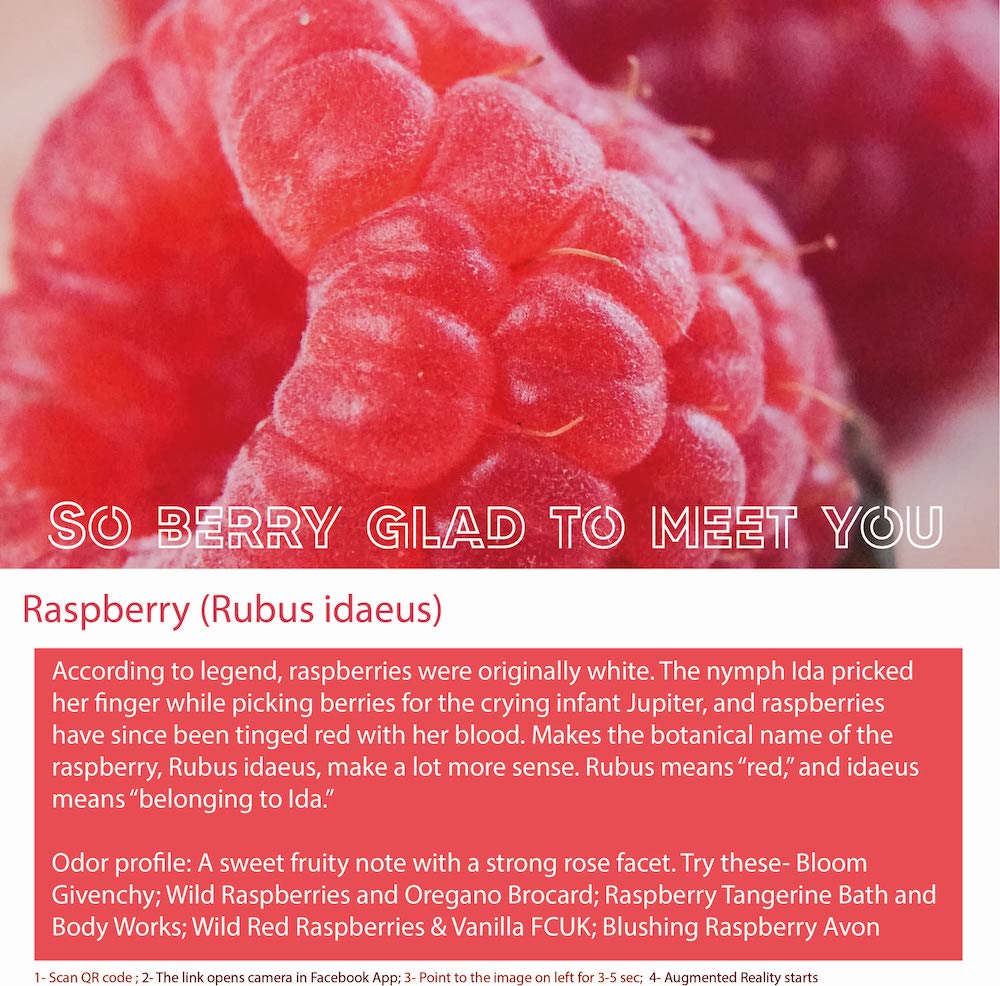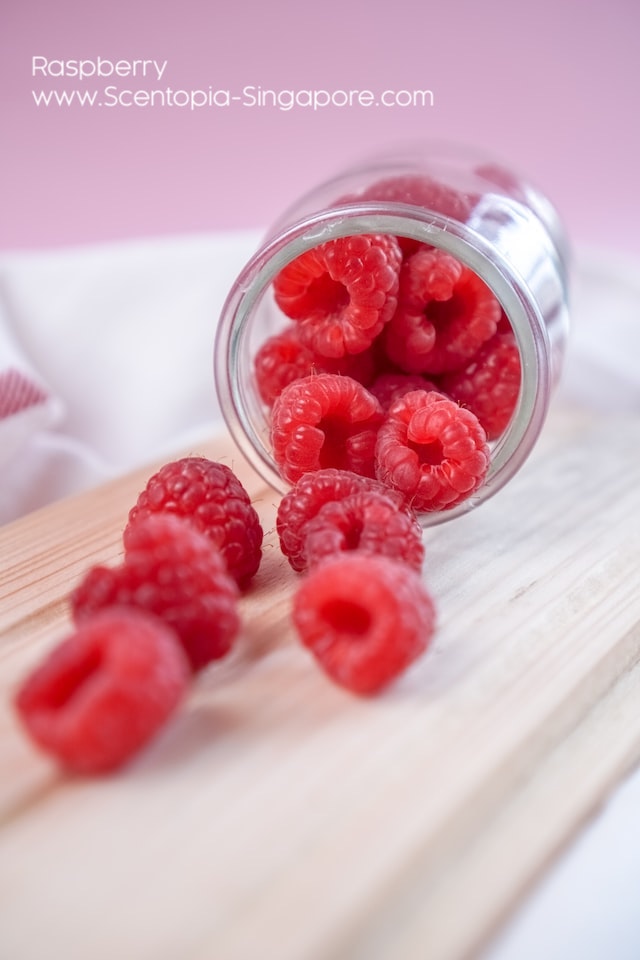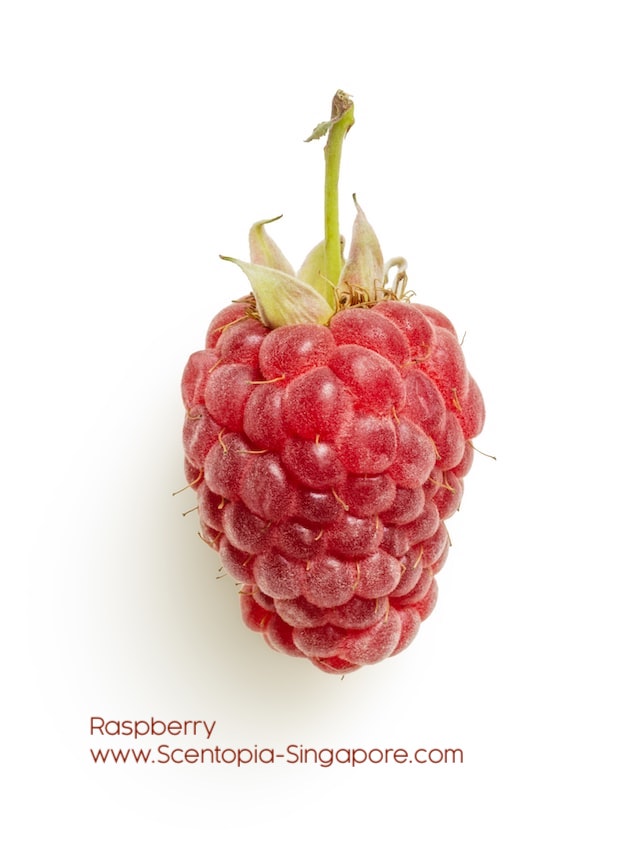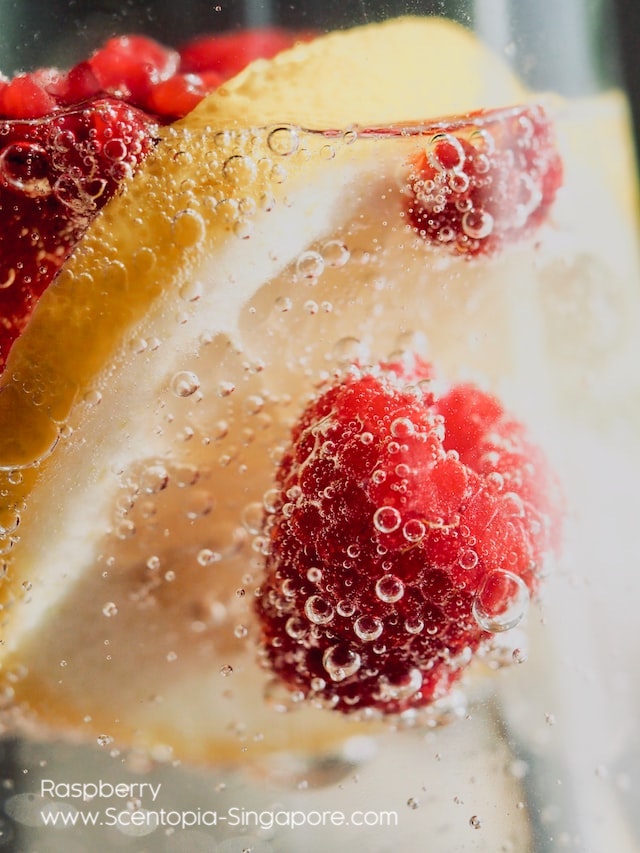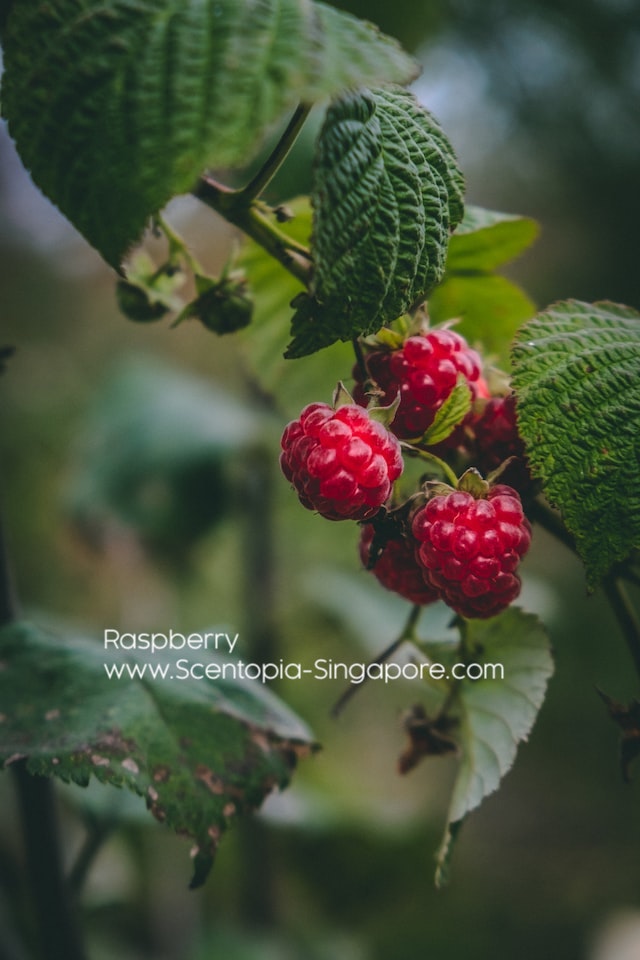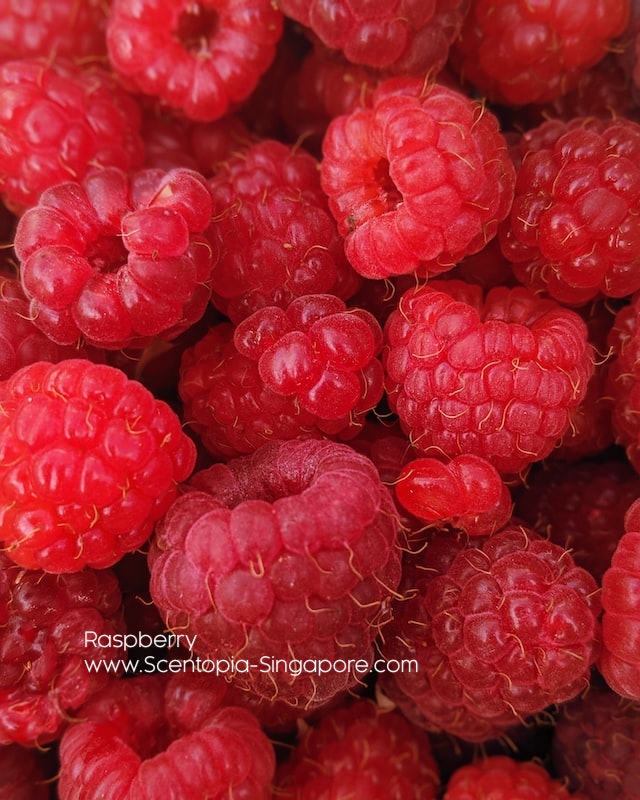Indulge in the Sweet and Tangy Raspberry Fragrance
Raspberry: The Alluring Berry of Fragrance, Flavor, and Potential Wellness
Introduction: Raspberry, with its vibrant color and sweet-tart taste, is a beloved berry celebrated for its delightful flavor, fragrance, and potential health benefits. Scientifically known as Rubus idaeus, this juicy fruit belongs to the Rosaceae family and has been cherished by cultures around the world for centuries. From inspiring perfumers with its fruity aroma to offering potential benefits in therapeutic oils and culinary delights, raspberry is more than just a berry. This essay delves into the captivating world of raspberry, encompassing its presence in perfumes, therapeutic oils, food, medicinal systems, historical significance, and intriguing fun facts about this extraordinary and cherished berry.
The Enchantment of Raspberry: Raspberry is renowned for its plump and juicy texture, making it a popular choice for eating fresh, using in desserts, and incorporating into various culinary creations. Its sweet and fruity aroma, along with its potential wellness benefits, has also inspired its use in perfumery and aromatherapy.
Perfumes and Fragrance: Raspberry's sweet and fruity fragrance has inspired perfumers to create scents that capture the essence of this delightful berry. Raspberry-inspired perfumes often evoke feelings of freshness, joy, and sweetness, making them popular choices for those seeking a touch of fruity allure.
Therapeutic Oils and Aromatherapy: Raspberry essential oil is not commonly available, but certain therapeutic oils with fruity characteristics, such as sweet orange or bergamot essential oil, may be used in aromatherapy to uplift the mood and promote a sense of happiness.
Medicinal Applications: Raspberry is a good source of vitamins, minerals, and antioxidants, making it valuable for supporting overall health and well-being. It is believed to have potential anti-inflammatory and immune-boosting properties.
Culinary Delights: Raspberry is a versatile berry used in various culinary creations. It is enjoyed fresh, used in desserts like pies, cakes, and tarts, and incorporated into jams, sauces, and smoothies. Its sweet-tart flavor adds a delightful touch to both sweet and savory dishes.
Historical Significance: Raspberry has a long history dating back to ancient times. It is believed to have originated in Eastern Asia and was later cultivated in various parts of the world. Raspberry plants have been cultivated for their fruit and medicinal properties.
Fun and Crazy Facts:
Raspberry, with its sweet-tart taste and potential wellness benefits, is a cherished and versatile berry that continues to captivate and inspire with its fruity allure. From its presence in culinary delights to its potential uses in aromatherapy and traditional medicine, raspberry offers a wealth of enjoyment and potential health benefits. As we savor the juicy taste and fruity aroma of raspberry and explore its historical significance, we are reminded of the enduring appeal and timeless charm of this extraordinary berry that has enriched our tables, cultures, and hearts for generations.
Introduction: Raspberry, with its vibrant color and sweet-tart taste, is a beloved berry celebrated for its delightful flavor, fragrance, and potential health benefits. Scientifically known as Rubus idaeus, this juicy fruit belongs to the Rosaceae family and has been cherished by cultures around the world for centuries. From inspiring perfumers with its fruity aroma to offering potential benefits in therapeutic oils and culinary delights, raspberry is more than just a berry. This essay delves into the captivating world of raspberry, encompassing its presence in perfumes, therapeutic oils, food, medicinal systems, historical significance, and intriguing fun facts about this extraordinary and cherished berry.
The Enchantment of Raspberry: Raspberry is renowned for its plump and juicy texture, making it a popular choice for eating fresh, using in desserts, and incorporating into various culinary creations. Its sweet and fruity aroma, along with its potential wellness benefits, has also inspired its use in perfumery and aromatherapy.
Perfumes and Fragrance: Raspberry's sweet and fruity fragrance has inspired perfumers to create scents that capture the essence of this delightful berry. Raspberry-inspired perfumes often evoke feelings of freshness, joy, and sweetness, making them popular choices for those seeking a touch of fruity allure.
Therapeutic Oils and Aromatherapy: Raspberry essential oil is not commonly available, but certain therapeutic oils with fruity characteristics, such as sweet orange or bergamot essential oil, may be used in aromatherapy to uplift the mood and promote a sense of happiness.
Medicinal Applications: Raspberry is a good source of vitamins, minerals, and antioxidants, making it valuable for supporting overall health and well-being. It is believed to have potential anti-inflammatory and immune-boosting properties.
Culinary Delights: Raspberry is a versatile berry used in various culinary creations. It is enjoyed fresh, used in desserts like pies, cakes, and tarts, and incorporated into jams, sauces, and smoothies. Its sweet-tart flavor adds a delightful touch to both sweet and savory dishes.
Historical Significance: Raspberry has a long history dating back to ancient times. It is believed to have originated in Eastern Asia and was later cultivated in various parts of the world. Raspberry plants have been cultivated for their fruit and medicinal properties.
Fun and Crazy Facts:
- Raspberry Varieties: There are several varieties of raspberries, including red, black, purple, and golden raspberries, each with its unique taste and characteristics.
- Symbol of Love: In some cultures, raspberries are associated with love and fertility. In Greek mythology, raspberries were once white but turned red when the goddess Ida pricked her finger while picking them for her crying baby, Zeus.
- Raspberry Leaves: Raspberry leaves have been used traditionally to make herbal teas believed to have potential health benefits, especially during pregnancy.
- Raspberry Pi: The term "Raspberry Pi" refers to a series of small, affordable single-board computers used for educational and hobbyist purposes.
- Raspberry Records: The longest raspberry cane on record was over 40 feet long, producing a bountiful harvest of berries.
Raspberry, with its sweet-tart taste and potential wellness benefits, is a cherished and versatile berry that continues to captivate and inspire with its fruity allure. From its presence in culinary delights to its potential uses in aromatherapy and traditional medicine, raspberry offers a wealth of enjoyment and potential health benefits. As we savor the juicy taste and fruity aroma of raspberry and explore its historical significance, we are reminded of the enduring appeal and timeless charm of this extraordinary berry that has enriched our tables, cultures, and hearts for generations.
To experience augmented reality, please open the Facebook-app using QR code and point to the image below
Exploring the Rich and Vibrant Aroma of Berries
Raspberry is a sweet and juicy fruit that is widely enjoyed around the world. Here are a few facts about raspberries:
- Botany: Raspberries are a species of bramble fruit that belong to the genus Rubus, and they are native to Europe and North America. They grow on trailing shrubs and are characterized by their delicate, juicy berries and their red, purple, or black color.
- Culinary uses: Raspberries are widely used in cooking and baking, and they are popular for their sweet and slightly tart flavor. They are often used in desserts, jams, jellies, syrups, and baked goods, and they are also a popular topping for yogurt, ice cream, and oatmeal.
- Health benefits: Raspberries are a rich source of vitamins, minerals, and antioxidants, and they are associated with a range of health benefits. For example, they are high in vitamin C, manganese, and fiber, and they are also a good source of antioxidants that may help protect against chronic diseases.
- Cultivation: Raspberries are grown commercially in many regions around the world, and they are a popular crop due to their high yields and their delicious flavor. They are typically grown in temperate regions and are usually harvested in late spring to early summer.
Raspberry Perfume Collection: Fruity Elegance Redefined
Raspberries are native to Europe and North America, and they have been enjoyed for their sweet and juicy berries for thousands of years. Here are a few key points about the history of raspberries:
- Ancient times: Raspberries were enjoyed by ancient civilizations, and they were widely used in cooking and medicine. They were believed to have numerous health benefits and were used to treat a variety of ailments.
- Middle Ages: During the Middle Ages, raspberries were widely cultivated in monasteries and were used to make syrups, jams, and other sweets. They were also used in medicine and were believed to have therapeutic properties.
- New World: When Europeans arrived in the New World, they brought raspberries with them, and they soon began to grow them in North America. Over time, new varieties of raspberries were developed that were better suited to the climate and soil conditions of the New World.
- Commercial cultivation: In the 19th and 20th centuries, raspberries became widely grown commercially, and they are now grown in many regions around the world. Advances in breeding and cultivation techniques have led to the development of new varieties of raspberries that are high yielding and flavorful.
Shop Berry-Inspired Perfumes Online at Scentopia Singapore
Raspberries are considered to have many health benefits, and they are often used for their therapeutic properties. Here are a few key ways in which raspberries are believed to be therapeutic:
- Antioxidants: Raspberries are a rich source of antioxidants, which are compounds that help protect the body against damage from free radicals. These antioxidants may help reduce the risk of chronic diseases, such as heart disease, cancer, and type 2 diabetes.
- Fiber: Raspberries are high in fiber, which is important for digestive health and can help regulate blood sugar levels. They are also low in calories, making them a good choice for people who are trying to maintain a healthy weight.
- Vitamin C: Raspberries are a good source of vitamin C, which is important for maintaining a healthy immune system. Vitamin C is also an antioxidant that can help protect the body against damage from free radicals.
- Manganese: Raspberries are high in manganese, which is important for bone health, wound healing, and the metabolism of carbohydrates and fats.
Unveiling the Allure of Raspberry Fragrance
Raspberries have been featured in art and culture in a variety of ways over the years. Here are a few examples:
- Food in art: Raspberries have been a popular food subject in art throughout history, and they have been depicted in paintings, sculptures, and other forms of art. For example, raspberries are often depicted in still life paintings of fruits and other food items.
- Literature: Raspberries have been mentioned in literature for centuries, and they have been used as symbols and metaphors in many works of fiction and poetry. For example, raspberries have been used to represent love, innocence, and youth in some works of literature.
- Music: Raspberries have been featured in music as well, and they have been mentioned in lyrics and used as inspiration for songs. For example, the song "Raspberry Beret" by Prince is a popular example of a song that features raspberries as a theme.
- Advertising: Raspberries are often used in advertising, particularly in advertisements for food products. They are frequently depicted as juicy, sweet, and delicious, and they are often used to promote products like jams, syrups, and desserts.
Crafting the Perfect Raspberry Perfume
The scent profile of raspberries is sweet, juicy, and slightly tart, with a fresh and fruity aroma. The scent of raspberries comes from compounds called esters and aldehydes, which are naturally occurring compounds in the fruit. Some of the key scent notes in raspberries include:
- Citronellol: A floral and citrusy aroma that adds a sweet, fresh note to the scent of raspberries.
- Limonene: A citrusy aroma that adds a zesty and refreshing note to the scent of raspberries.
- Linalool: A floral and spicy aroma that adds a warm and spicy note to the scent of raspberries.
- Maltol: A sweet and fruity aroma that adds a sweet, juicy note to the scent of raspberries.
- Esters: Esters are responsible for the sweet and fruity aroma of raspberries. Examples of esters found in raspberries include ethyl butyrate, which has a fruity and sweet aroma, and isobutyl acetate, which has a sweet and fruity aroma with a hint of banana.
- Aldehydes: Aldehydes contribute to the fresh and slightly tart aroma of raspberries. Examples of aldehydes found in raspberries include hexanal, which has a fresh and green aroma, and octanal, which has a fresh and citrusy aroma.
- Alcohols: Alcohols also contribute to the fresh and fruity aroma of raspberries. Examples of alcohols found in raspberries include linalool, which has a floral and spicy aroma, and geraniol, which has a floral and rosy aroma.
- Ketones: Ketones contribute to the sweet and slightly floral aroma of raspberries. An example of a ketone found in raspberries is diacetyl, which has a sweet and buttery aroma.
Join Scentopia, Sentosa's latest tourist attraction wonderful orchid scent crafting, fragrance tour, bridal shower or corporate team building which includes perfume making onsite and offsite, beach activities and more. We also serve primary school learning journey, secondary students and pupil on industrial excursions. Know more about our orchids perfume bar or therapeutic orchid scents and other wellness aromas. Conatct Perfume workshop or book a scent crafting session here.

